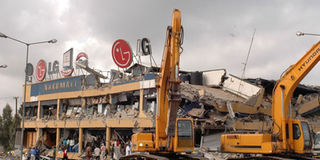Loss and pain mark start of superhighway construction

Demolitions that were meant to pave way for the superhighway construction. Photo/FILE
What you need to know:
- The operation that began at 5 a.m. saw Nakumatt Thika, Roy Transporters, Vision Grill Restaurant and Kenol service station demolished as officers from the General Service Unit and Administration Police kept watch.
- A restaurant owner, Mr Henry Mureithi, opened his premises to onlookers and allowed them to eat and drink to their fill before it was pulled down.
Early Saturday on November 1, 2008, two government bulldozers descended on Nakumatt Supermarket and the headquarters of Roy Transporters, on Thika Road.
Hours later, the fine buildings and businesses worth millions of shillings lay in ruins.
That was the first signal that the expansion of Thika Road was no longer a pipe dream but a reality, although people with businesses on the road had gone to court seeking to bar the Ministry of Works from demolishing their premises.
The operation that began at 5 a.m. saw Nakumatt Thika, Roy Transporters, Vision Grill Restaurant and Kenol service station demolished as officers from the General Service Unit and Administration Police kept watch.
Three banks — Barclays, Equity and NIC — had to rush to empty their automated teller machines located at Nakumatt before they were destroyed or fell into the hands of looters, who had arrived early.
A restaurant owner, Mr Henry Mureithi, opened his premises to onlookers and allowed them to eat and drink to their fill before it was pulled down.
'NOT RECEIVED ORDER OF DEMOLITIONS
Although Ministry of Roads officials insisted that they had served the business owners with a three-month quit order, the business people accused the ministry of rushing to demolish the buildings despite a barring court order.
A Nakumatt operations director, Thiagarajan Ramamurthy, told the press that morning that he had not received the order of the demolitions.
And Muktah Omar, the chairman of Roy Properties, which was hosting Roy Transporters, said: “There is no justice in this country because the order restricts any form of demolition taking place here.”
The demolitions marked the beginning of the construction of the Thika Superhighway, which was to see the previous four-lane road expanded into an eight-lane modern highway from Nairobi to the precincts of Thika town.
The construction would also see the replacement of all the roundabouts on the stretch with a system of flyovers and underpasses in a development that was expected to ease the flow of traffic between the capital and Thika town.
The construction was officially commissioned by President Mwai Kibaki, who described the superhighway as a major link to the great Trans-African Highway from Cape Town to Cairo.
Jointly financed by the Kenya Government, the African Development Bank and the Chinese Government, the construction was initially supposed to cost 29 billion, but ended up consuming Sh32 billion.
The road links the main commercial centres of Isiolo, Marsabit, Moyale and Mandera with Nairobi and provides a reliable transport corridor linking Kenya with Ethiopia in the north, and Tanzania in the south.
President Kibaki described the superhighway as “a glaring example of government efforts and commitment to transform Kenya into a strong economic hub for the region and beyond.”
It was estimated that the road would reduce travel times between Thika town and Nairobi from about 1-2 hours to 30 minutes.
FIRST OF ITS KIND
The 50-kilometre superhighway was the first of its kind in the Eastern Africa, and one of the fears was that vandals might target the road furniture.
The Kenya National Highways Authority (KeNHA) Director General, Meshack Kidenda, said there was urgent need to address the issue of vandalism which, he noted, could reverse some of the gains made on the road.
“Vandalism is a big problem and it’s going to be big on this road from what we are seeing, because even before the contractors have moved out, we are seeing that people are coming to vandalise,” he told the press.
“It’s a national problem and we are seeing it not only on Thika Road, but also on our other roads.
After completion, the superhighway improved transport services and urban mobility by reducing general transport costs, providing employment opportunities, housing and recreation activities.
Besides, property prices along the highway shot up, and several real estate developments started coming up.
Notable developments include Garden City, European furniture chain, IKEA, Nakumatt and Uchumi supermarkets, and PepsiCo, which has put up a Sh2.4 billion bottling plant in Ruaraka.
Other residential property developments include the Sh2.5 billion Tatu City, Thika Greens, and Migaa Estate.



